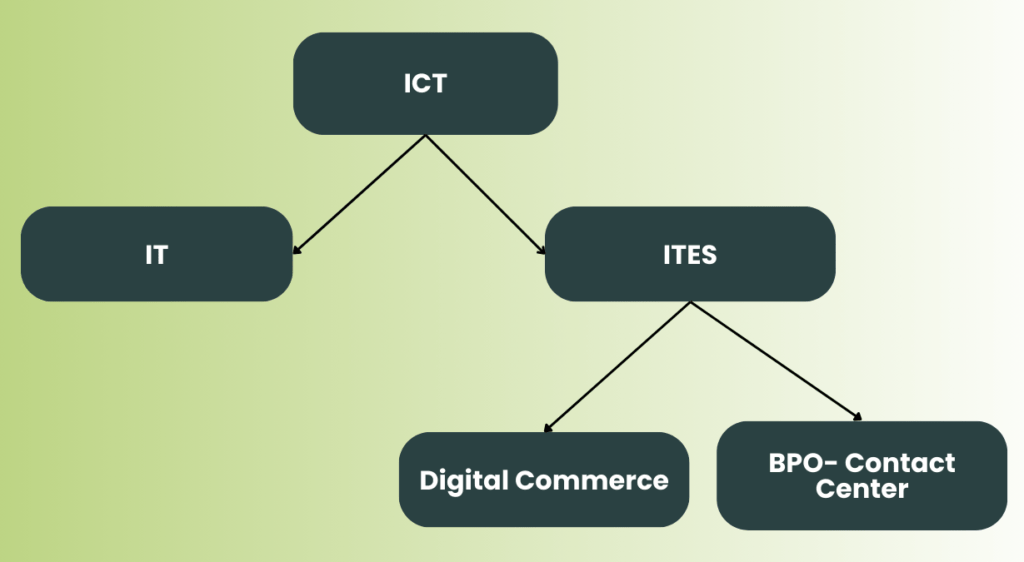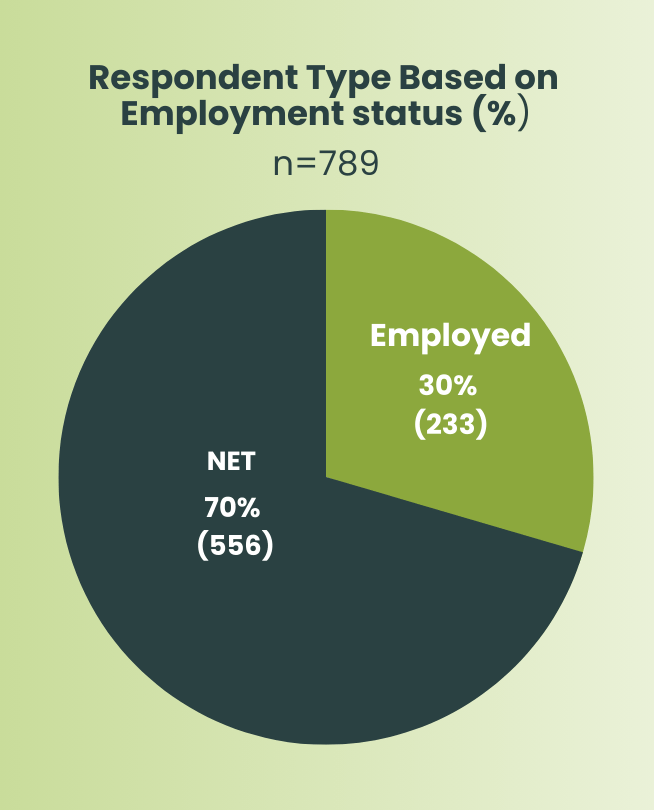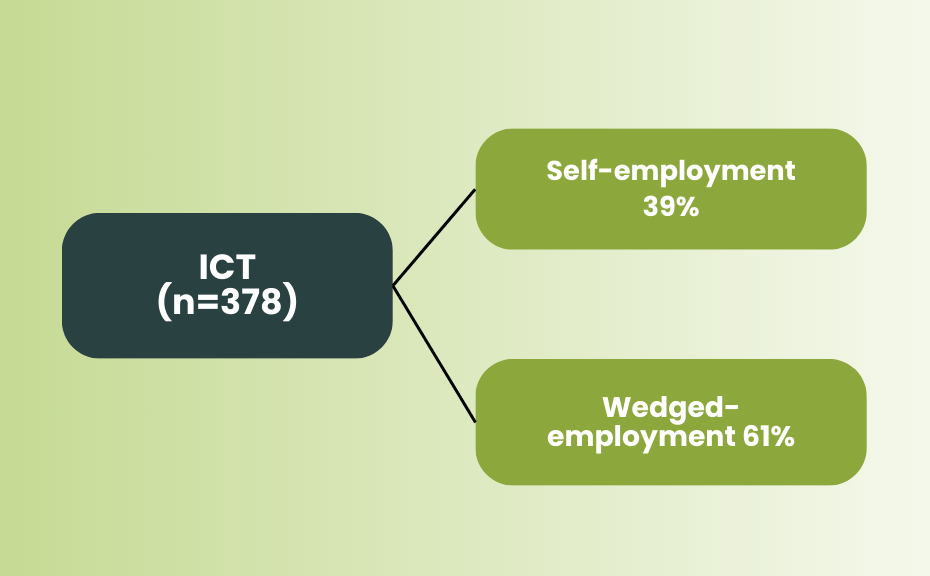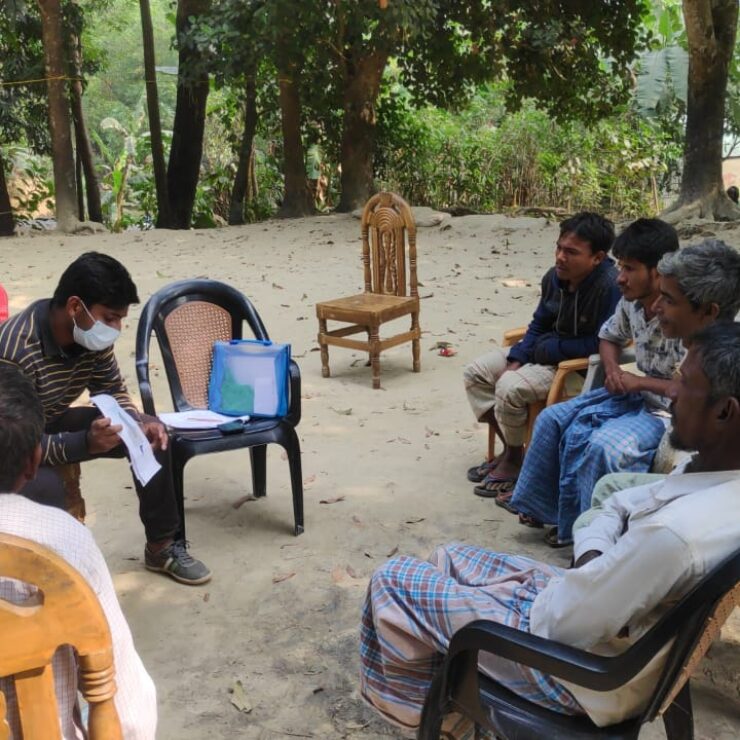
Assessing Skill Gaps and Exploring Employment Opportunities in Bangladesh’s ICT Sector: A Sectoral Assessment
Background
In Bangladesh, approximately 65% of the total population falls within the working age range of 15 to 59 years. However, a significant portion of this demographic remains underutilized due to existing skill gaps and mismatches.According to the Bangladesh Institute of Development Studies (BIDS), 96% of the population lacks essential skills for the country’s production sector. This has led to high youth unemployment at 10.6%, significantly surpassing the national average of 4.6%. Moreover, even among those who manage to secure employment opportunities, a staggering 85% are part of the informal sector, where productivity and income levels are notably low.
Bangladesh’s Information and Communication Technology (ICT) sector, contributing 1.28% to GDP and employing 1 million people, is rapidly growing at 40% annually. In FY 22, Bangladeshi IT firms significantly expanded their global presence, achieving over $1.4 billion (BDT 149.17 billion) in annual exports. In terms of freelancing, Bangladesh has approximately 650,000 freelancers, with around 500,000 actively engaged. However, there is a noticeable shortage of skilled workers in this sector, with a demand for 4 million trained professionals compared to the current workforce of 2 to 2.5 million.
To address these critical issues and foster sustainable economic growth, Swisscontact, in collaboration with the Embassy of the Kingdom of Netherlands, has initiated the “Building Youth Employability Through Skills” (BYETS) project & to assess the feasibility and potential impact of this initiative, Inspira Advisory and Consulting Limited was commissioned to conduct the sectoral assessments for the Agro-Processing and ICT sectors in specific regions. This comprehensive strategy endeavors to overcome employment challenges and pave the way for a more promising future for Bangladesh’s workforce. In this case study we will be discussing our findings and recommendations for the ICT sector.
Study Approach
The sectoral assessment was conducted to serve the following purposes:
- Identify market-driven skills demanded by employers.
- Assess the capacity of TSPs to offer in-demand courses.
- Identify cluster pockets with capacity to accommodate youth in income generating activities.
- Identifying scopes for income generation with relevant stakeholders
Study Findings

The Information and Communication Technology (ICT) sector in Bangladesh is expected to witness robust growth in the coming years, with a projected Compound Annual Growth Rate (CAGR) of 14% from 2023 to 2025. This growth can be attributed to several factors, including the government’s focus on promoting digital transformation, the availability of a skilled workforce, and favorable economic conditions. As a result, the ICT sector is becoming a key driver of the country’s economic development. Broadly, ICT can be divided into two subcategories based on type of products and services: Information Technology (includes web development, software development, application development, AI models etc.)
A. Information & Technology (IT)
In Bangladesh, IT firms make up about 47% of the overall ICT sector. Despite the country producing roughly 20,000 computer science and engineering graduates annually from both public and private universities, there remains a significant deficit in technical personnel. IT companies need approximately 7,500-8,000 technical professionals each year, but there continues to be a shortage of qualified candidates. Reports even show that around 80% of computer science and engineering graduates struggle with basic coding skill tests, underscoring a deficiency in their skill sets.
IT firms in Bangladesh prioritize hiring for roles like software development, web development, application support and management, and mobile application development. To address the skill gap, a study by RAPID-UNDP-Bangladesh Accelerator Lab suggests training in coding languages, including Angular (TypeScript), ASP, C#, C/C++, Django (Python), Flutter (Dart), Go, HTML/CSS, Java, JavaScript, Laravel, MySQL, Node.js, PHP, and Python. However, the study highlights a particular emphasis on Java and Python, as they are highly relevant and in-demand within the industry.
Addressing the coding skill gap among ICT graduates is crucial to meet industry demands in the era of the fourth industrial revolution. There is a growing need for skill development in emerging technologies such as blockchain, 3D technology, and virtual reality. The Ministry of ICT in Bangladesh believes that enhancing skills in these areas will lead to high-value work opportunities and contribute to the nation’s technological progress. Additionally, there is a significant opportunity for Bangladeshi IT professionals in foreign markets, such as Japan, which is projected to face a shortage of 500,000 engineers by 2025. Outsourcing IT services to meet this demand could benefit Bangladeshi IT workers, especially freelancers engaged in IT outsourcing.
B. Information & Technology Enabled Services -ITES
Digital Commerce
The digital commerce industry in Bangladesh encompasses various types of online business models, including e-commerce and f-commerce. E-commerce refers to conducting business transactions online, while f-commerce specifically involves conducting e-commerce activities through Facebook. Both sectors have experienced significant growth in recent years, contributing to the country’s digital economy and providing employment opportunities.
- E-commerce: Bangladesh’s e-commerce sector comprises roughly 2,500 businesses, including 1% large, 4% medium-sized, and 95% small enterprises. These businesses provide employment for approximately 100,000 individuals, underscoring their substantial contribution to job creation and economic development. The business-to-customer (B2C) e-commerce market in Bangladesh is projected to grow annually at a rate of 17.61%, with a 2022 valuation of Tk 65,966 crore ($6.1 billion).
In the expanding e-commerce sector, there are several in-demand employment opportunities. Delivery services play a critical role, with a growing need for delivery personnel who require basic IT skills like navigation, software handling, and communication. As e-commerce continues to grow, there will be an increasing demand for such delivery personnel.
Another employment avenue within e-commerce is customer support. Despite digital transactions, customer support roles remain vital for assisting customers with inquiries and issues. With the sector’s expansion, the demand for customer support personnel is expected to increase.
Large-scale e-commerce platforms in Bangladesh, such as Daraz, Chaldal, and Bikroy.com, recruit a significant number of employees, often hiring a couple of hundred individuals for telesales operations. These platforms serve as key players in the e-commerce industry, contributing to its overall growth and providing employment opportunities to the youth.
- F-commerce: In Bangladesh, F-commerce, conducted through Facebook, is a significant part of digital commerce. It includes around 300,000 F-commerce pages, with an estimated market size of Tk 1,000 crore. Notably, 70% of e-commerce ventures set up during the pandemic through F-commerce are owned by women, showcasing a growing trend of female entrepreneurship in the digital realm. Additionally, there’s been a 65% increase in Instagram businesses owned by women.
In F-commerce, virtual assistants are essential for managing platforms and providing customer support, especially on high-traffic pages. As F-commerce grows, the demand for virtual assistants is on the rise.
Digital marketers are also in high demand in F-commerce, specializing in SEO, WordPress, content creation, and campaign management due to the increasing popularity of the internet and online shopping.
Graphic designers also play a vital role in F-commerce for creating essential visual content on platforms like Facebook, and their versatile skills offer rapid career advancement through advanced training.
In terms of hiring practices, F-commerce merchants typically contractually hire based on their specific needs, as entrepreneurs may lack expertise in areas like product positioning, page management, digital marketing, and cybersecurity. This creates opportunities for professionals with these skills to support F-commerce enterprises. To advance the digital commerce industry in Bangladesh, fostering an environment that encourages entrepreneurship and skill development is crucial. Providing training programs in digital marketing, graphic design, and other relevant skills equips individuals for success. Additionally, initiatives to enhance cybersecurity and privacy protection are essential to build trust in online transactions and promote sustainable growth in the digital commerce sector.
Business Process Outsourcing (BPO) – Contact Centers
The BPO industry in Bangladesh provides employment opportunities to a significant number of individuals. Currently, there are over 70,000 people working directly in the BPO sector, with an additional 50,000 people engaged in freelance work within the industry. The presence of both full-time employees and freelancers highlights the flexibility and diverse employment options available in this sector. Large-scale BPO companies in Bangladesh significantly contribute to job creation, hiring hundreds of individuals annually. The Rajshahi Hi-Tech Park is also becoming an attractive hub for BPO firms, offering additional growth and investment opportunities in the sector.
In the BPO industry in Bangladesh, skill requirements vary based on service types. Non-voice BPOs demand skills in data entry, CRM, accounting software, cybersecurity, and digital marketing for efficient business process management. In contrast, voice-based BPOs, known as contact centers, seek individuals with strong soft skills, including language proficiency, effective communication, teamwork, and basic computer knowledge. With the private sector’s growth in Bangladesh, there’s an anticipated rise in demand for voice-based BPO services, offering more opportunities for individuals with these skills.
Advanced BPOs, like Quantanite, are increasingly in need of professionals skilled in AI model development, machine learning, and robotic process automation (RPA) to enhance their operations. These specialized skills are essential for optimizing BPO processes and harnessing AI technologies for improved efficiency and accuracy. Data annotation and data entry play a pivotal role in training AI learning models, facilitating the development of advanced AI solutions.
To ensure sustained growth and success in the BPO industry, continuous investment in skill development is essential. Providing training programs and resources to enhance technical skills, soft skills, and emerging technologies will enable individuals to meet the evolving demands of the industry.
Demography of Survey Sample Size
Inspira aimed for a 50% female representation in their survey but faced challenges due to the low participation of employed individuals in the sample (25%) and the relatively low female labor force participation rate (around 36% in 2022) led to lower proportion of female respondents.


Preferred Sector by NET (Not in Employment or Training) group
Maximum youths have good knowledge about basic ICT related occupations, and they think through ICT related jobs they can earn more. Due to the government’s diverse range of initiatives regarding the vision of a Digital Bangladesh, there has been a notable promotion of freelancing and other (IT) related opportunities throughout the nation. This has led to a greater awareness among the youths of the types of job roles available in the industry, as well as the requisite skills and potential income opportunities associated with them. Typically, due to the nature of the ICT industry being primarily desk-oriented work the younger generation tends to exhibit a higher interest towards the ICT industry.
Preferred Occupations by NET group
In the targeted districts, Graphic Design, Digital Marketing, and Web Design & Development are the most preferred youth occupations, followed by Data entry & database management and App development. These choices are popular due to their recognition and government-supported training programs. Additionally, the youth tend to prioritize learning skills that can be acquired quickly and offer earning opportunities. Thus, the occupations are particularly appealing since they can be learned within 3 to 6 months with lower training costs compared to IT-intensive jobs that typically require a degree or higher education.
Preferred Employment Type
Around one-third of young people choosing ICT careers prefer traditional wage employment due to perceived requirements for work experience and the competitive nature of the freelance industry. Some feel insecure about freelancing with basic to intermediate skills. Many opt for the security of structured wages, while others balance freelance work with jobs to have dual income streams and flexibility.

Many opt for the security of structured wages, while others balance freelance work with jobs to have dual income streams and flexibility. While youths tend to prioritize employment in the ICT industry, it is important to recognize the value of entrepreneurship skills, particularly given the popularity of freelancing among this demographic.
Willingness To Have Training
In the targeted regions, the majority of youths expressed a positive attitude toward training programs in the ICT sector, but fewer than three-fourths have access to them. While various training opportunities are available, high course fees often limit enrollment. In six districts, more than 90% of young people are interested in training, with the exception of Gazipur, where over one-third show no interest. Barriers reported in Gazipur and Satkhira include limited access to quality training centers, necessitating long travel distances, reducing interest in training. Overall, the top three barriers to training identified during FGDs were highlighted by youths-
- Lack of job placement services at training centers, leading to doubts about the value of certifications.
- Limited availability of reputable training centers in peri-urban areas, prompting a need for residential facilities in urban centers.
- Financial constraints prevent students from investing in training, leading to a demand for subsidized or free training
Willingness to Pay
Around three-fourths of interested youth in the ICT sector are willing to pay for training, likely because they are often advanced, university students or graduates who understand the industry’s potential returns. They see a promising future by excelling in specific skills. Despite the growing interest among young individuals in paid training courses within the ICT industry, it is observed that the youth demographic, across both industries, exhibits a reluctance to pay beyond a threshold of 5000 BDT for training programs. Over 80% of youths are willing to spend a maximum of 5000 BDT towards training programs. This is because youths have some financial barriers as most of them are students or job seekers who have limited to no income.

Quality & Usefulness of The Training
Training Modality: More than half of the youths who are interested in training prefer mixed methods of training. ICT online training is common practice as there are a lot of online training providers in the market providing a series of courses. But in the peri-urban region, youths are not comfortable in online training because of two reasons: Internet cost and the need for hands-on training experience. So, in the field of ICT, both online and offline modalities can be given priority. However, recorded classes may be made available for the purpose of refresher training.
Training Quality: In the ICT industry, over a quarter of respondents highlight a significant issue: the lack of a well-designed curriculum in ICT-based training. Focus group discussions revealed that trainees often encounter outdated curriculums, which is problematic in a field as dynamic as ICT, where new technologies continually emerge. The trainees specifically pointed out the absence of the latest AI-based knowledge in the curriculums and suggested updating them to align with emerging tech trends.
In terms of training quality, discussions with NET groups revealed that individuals who hadn’t received prior training enrolled in programs but discontinued them due to subpar quality. The issues included a shortage of qualified trainers and standardized delivery methods. Training centers outside of Dhaka particularly faced challenges in securing well-trained trainers, whereas those in Dhaka typically maintained higher-quality standards due to recruiting from reputable institutes.
Access of Job News
In Dhaka and Khulna, over 50% of young individuals find it easier to access job news, primarily due to high smartphone and internet usage in these districts. In the ICT sector, about 50% of employees secure jobs through word of mouth, while online job portals, such as bdjobs.com and Chakri.com, are also commonly used for job searches, with 20 out of every 100 employees finding jobs through these portals. In the context of industry collaborations, there is potential for partnership with training service providers who refer their trainees for employment opportunities. Given the prevalence of word-of-mouth practices in the ICT industry, these service providers can serve as intermediaries for connecting youths with job prospects.
Skill Supply Side : Training Service Providers (TSP)
Training service providers in Bangladesh are entities providing skill-based training in diverse trades and occupations. These service providers are owned and led by different stakeholders, such as individuals, organizations, government, etc. and can operate in different modalities and formations.In addition to the training centers, there are also trade/sector specific training initiatives arranged by multiple stakeholders for the purposes of trade acceleration, capacity development, technological improvement, product development, etc.
Recommendations for sub-sector & skill sets : Training Opportunity
|
Sector |
Sub-sector |
Potential Occupation |
Employment Opportunity |
Skill Requirement |
|
|
ICT |
ITES |
Digital Commerce: E-commerce |
1. Delivery Man 2. Customer Care Officer 3. Digital Marketer |
High |
1. Basic map navigation, App usage 2. Spoken English, Pronunciation & Communication skill 3. Affiliate Marketing (High level digital marketing skill such as pay per click (PPC)) |
|
Digital Commerce: F Commerce |
1. Virtual Assistant 2. Digital Marketer 3. Graphic designer 4. Boost Agent |
High |
1. Social Page Management 2. Social Media Marketing 3. Basic Graphic designing 4. Page boosting |
||
|
BPO (Contact Centers) |
1. Customer Care Officers |
High |
Spoken English, Pronunciation & Communication skill |
||
|
IT |
Software, Security, Web Applications, Mobile applications. |
Current Demand 1. Graphic Designer 2.Web designer 3. App developer |
Medium |
1. Basic to intermediate Graphic Designing 2. Web Designing 3. App Development |
|
|
In future Demand 1. Software Developer 2. Cyber Security Analyst 3. Motion Graphics Designer |
Medium |
1. Programming Language, Software Testing 2. Ethical Hacking, Policy Guidelines, Coding 3. Animation |
|||
|
Machine Learning |
1. Data annotator |
Low |
Basic Computer Operation |
||
Functional Recommendations
- In ICT sector relevant training provision, for low-intensity training, such as basic graphics design, virtual assistance, Data Annotation, etc., a blend of online and off-line training would be a better approach to reach female and remotely living students.
- In the ICT sector, in provision of medium to higher intensity courses, which require a certain level of skill has already been acquired (usually basic training or equivalent skill requirement is achieved), training service providers can design courses considering the potential trainees’ level of participation. Consideration should be given to the youths from peri-urban areas who might need to arrange accommodation or similar facilities for such training.
- The study team proposes to cater to the trainees completing basic level already and are willing to engage in income-generating activities using these skills. As industry expects a minimum level of expertise in new recruits, the opportunity of receiving employment with advanced training is comparatively higher.




